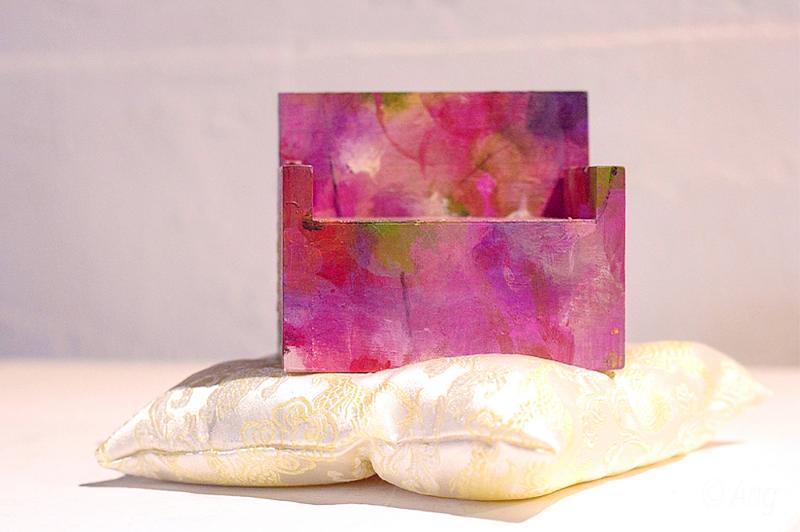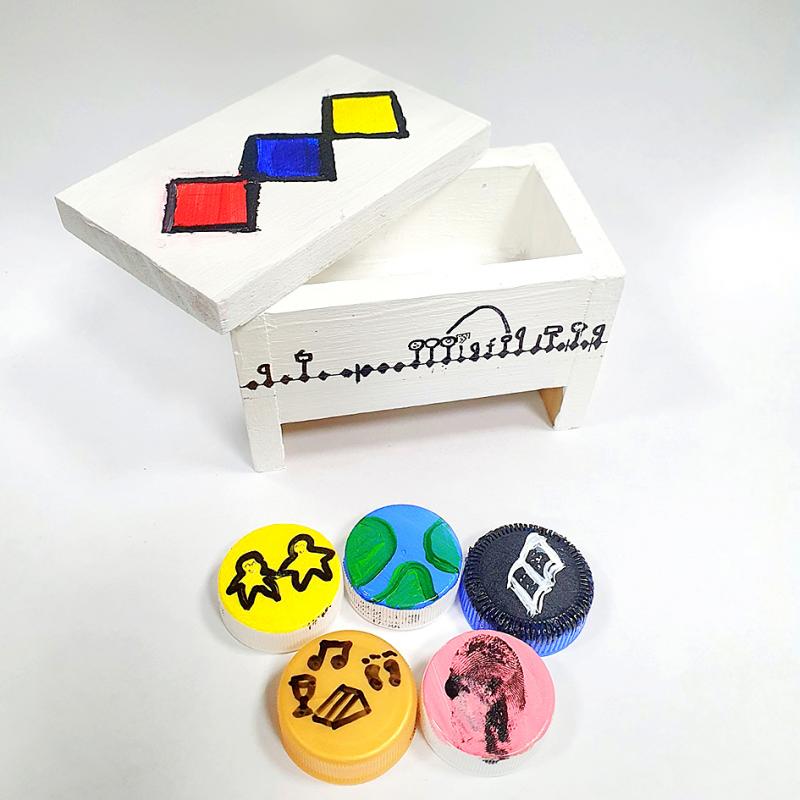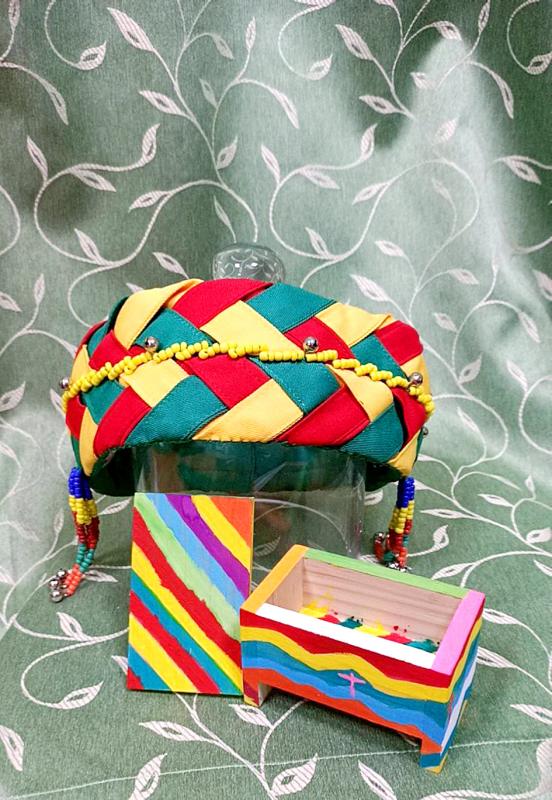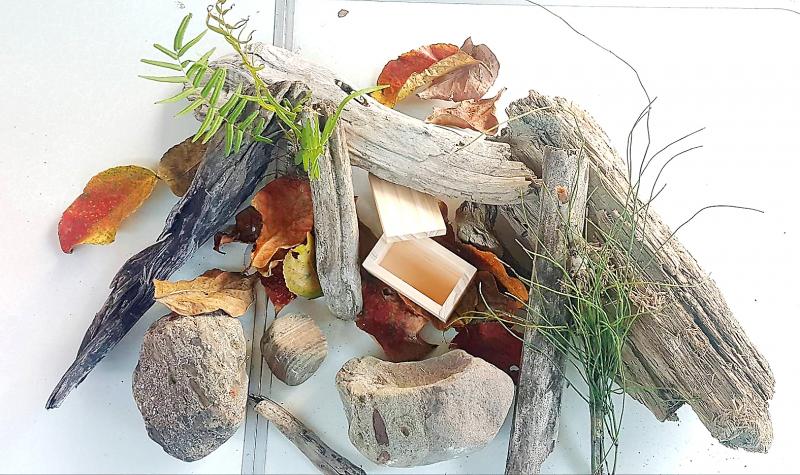Nineteen indigenous women from southern Taiwan received identical small wooden boxes earlier this year. With no specific instructions, they were asked to decorate them and tell a story.
“Almost none of our participants are artists, and most are traditional women from the village who are not used to expressing themselves,” says Maital Takiludun, who spearheaded and curated the project for Women’s Nest (女窩), a women’s group based in Kaohsiung’s Namasia District (那瑪夏). “We worked very hard to learn how to put our stories in the boxes.”
They are now the latest addition to the Women Without Borders initiative, launched in 1991 by US artist Lorraine Serena as a way for women to amplify their voices and share their untold stories. It has since reached 51 countries.

Photo courtesy of Red Room
Taipei arts and culture platform Red Room first brought the project to Taiwan last year, collecting 60 stories by Taiwan residents from 22 countries during their first Formosa Tales (寶島話匣子) exhibition for last year’s International Women’s Day.
After attending the opening in Yangmingshan last year, Women’s Nest volunteered to host this year’s show at their bakery in remote Takanua Village in Kaohsiung’s Namasia District. Maital says they were looking for art therapy activities for their members, and the box project came along at just the right time.
“Women in indigenous villages are often more repressed than those in the cities,” Maital says. “Even if you’re a career woman, when you go home you have to cook, look after chickens, ducks, geese and care for the elderly. Unlike Westerners, it’s very difficult for them to openly share their inner worlds. We help them express themselves step-by-step, from drawing to speaking to writing.”

Photo courtesy of Women’s Nest
In addition to the Bunun, Hla’alua and Kanakanavu groups that Women’s Nest works with, they also invited participants from sister organizations in the Tsou, Tao and Paiwan communities.
The exhibition opened this past weekend, and eventually the boxes and stories will be translated into English and displayed on Red Room’s Web site.
“Stories transform people,” Red Room’s Roma Mehta says. “Some who shared say they have never in their lives taken one moment to stop and think about who they are and where they fit into the world. They’ve just done what they thought they needed to do — depending on their upbringing. No matter what they do with [the project], it’s an opening — a window to who knows what?”

Photo courtesy of Women’s Nest
FIRST OPPORTUNITY
Red Room’s original plan last year was to take 100 boxes across the island and collect stories from every city, Mehta says, but due to COVID-19, the team distributed them to anyone they knew who was interested. She was surprised to get 60 back.
The results reflected Red Room’s diverse community. A half-American, half-Taiwanese teenager explored her dual-identity, a Syrian immigrant mourned her ravaged homeland and a Taiwanese woman wondered if she would ever be able to talk to her mother about her true feelings.

Photo courtesy of La Benida Hui
Topics ranged from environmental protection to spirituality, belonging, family and empowerment. Fifteen of them were chosen for Women Without Borders’ Web site: womenbeyondborders.org/search/?ser=taiwan.
“Each story blew my mind,” Mehta says. “As I received them and printed them out, each one just made me cry.”
Yasuko Okamoto, for example, dedicated her box, painted pink and sitting on a gold-embroidered cushion, to her 82-year-old mother, who has never had a day off as a traditional housewife.

Photo courtesy of Women's Nest
“She is like a comfortable sofa for her family but she doesn’t have her own chair,” Okamoto writes. “I would like to offer her a comfortable cushion, hoping she can take a rest sometimes.”
“It only hit her when she sat down to write her story,” Mehta says. “It’s something you don’t think about. She also shared that in all her years as an adult, as a wife, mother, student, she has never sat down and thought about her story. This was the first opportunity to. And she was not the only one who said that.”
REMEMBERING ROOTS
Maital has been involved with Women’s Nest since its founding in 2003 as a support and empowerment group for indigenous women in Kaohsiung. In addition to promoting the mother culture, providing sustainable skills and fostering talent, the group also encourages women to express themselves and share their stories.
The group has accomplished and endured a lot, including rebuilding after the devastating floods brought by Typhoon Morakot in 2009. But as founder Apu’u Kaaviana said last November in an Indigenous Sight (原視界) article, “Many of us seem to forget that we’re humans first, then women,” regarding the burdens and inequalities they face in the tight-knit, patriarchal villages. “I want to rediscover a women’s world view and let women be themselves again.”
Maital thought that the Women Without Borders project fit in nicely with what they’ve been trying to do. They didn’t agree to just participate — they offered to host this year’s exhibition in Namasia District.
With their 20th anniversary approaching, Maital says it was a good chance for members to reflect and remember why they joined in the first place. After giving out the boxes, they held art classes and workshops to get the women used to expressing themselves.
Maital says the story that moved her the most is by Tanivu (Chao Hui-chen, 趙惠珍), whom she mentored 18 years ago as a recent college graduate. Tanivu mostly grew up in the city, and knew little of Bunun culture when she arrived.
“She was with us for two years, learning the language, culture and way of life,” Maital says. But when they thought Tanivu was ready to take on a larger role, she decided to get married and move to Tainan. Maital worried that she would forget everything she had learned.
With her children grown up and her father ailing, Tanivu has been visiting Takanua again — and to Maital’s surprise, she never stopped learning the language and even became a certified teacher. Along with her Han-Taiwanese husband — who also learned Bunun — they have been promoting the culture in their community and church.
“Last time she came here, we were having a meeting and we invited her,” Maital says. “She heard that we were doing the wooden box project, and she wanted to join even though we had started already. She really wanted to express her feelings that have accrued over these two decades.”

In the March 9 edition of the Taipei Times a piece by Ninon Godefroy ran with the headine “The quiet, gentle rhythm of Taiwan.” It started with the line “Taiwan is a small, humble place. There is no Eiffel Tower, no pyramids — no singular attraction that draws the world’s attention.” I laughed out loud at that. This was out of no disrespect for the author or the piece, which made some interesting analogies and good points about how both Din Tai Fung’s and Taiwan Semiconductor Manufacturing Co’s (TSMC, 台積電) meticulous attention to detail and quality are not quite up to

April 21 to April 27 Hsieh Er’s (謝娥) political fortunes were rising fast after she got out of jail and joined the Chinese Nationalist Party (KMT) in December 1945. Not only did she hold key positions in various committees, she was elected the only woman on the Taipei City Council and headed to Nanjing in 1946 as the sole Taiwanese female representative to the National Constituent Assembly. With the support of first lady Soong May-ling (宋美齡), she started the Taipei Women’s Association and Taiwan Provincial Women’s Association, where she

Chinese Nationalist Party (KMT) Chairman Eric Chu (朱立倫) hatched a bold plan to charge forward and seize the initiative when he held a protest in front of the Taipei City Prosecutors’ Office. Though risky, because illegal, its success would help tackle at least six problems facing both himself and the KMT. What he did not see coming was Taipei Mayor Chiang Wan-an (將萬安) tripping him up out of the gate. In spite of Chu being the most consequential and successful KMT chairman since the early 2010s — arguably saving the party from financial ruin and restoring its electoral viability —

It is one of the more remarkable facts of Taiwan history that it was never occupied or claimed by any of the numerous kingdoms of southern China — Han or otherwise — that lay just across the water from it. None of their brilliant ministers ever discovered that Taiwan was a “core interest” of the state whose annexation was “inevitable.” As Paul Kua notes in an excellent monograph laying out how the Portuguese gave Taiwan the name “Formosa,” the first Europeans to express an interest in occupying Taiwan were the Spanish. Tonio Andrade in his seminal work, How Taiwan Became Chinese,